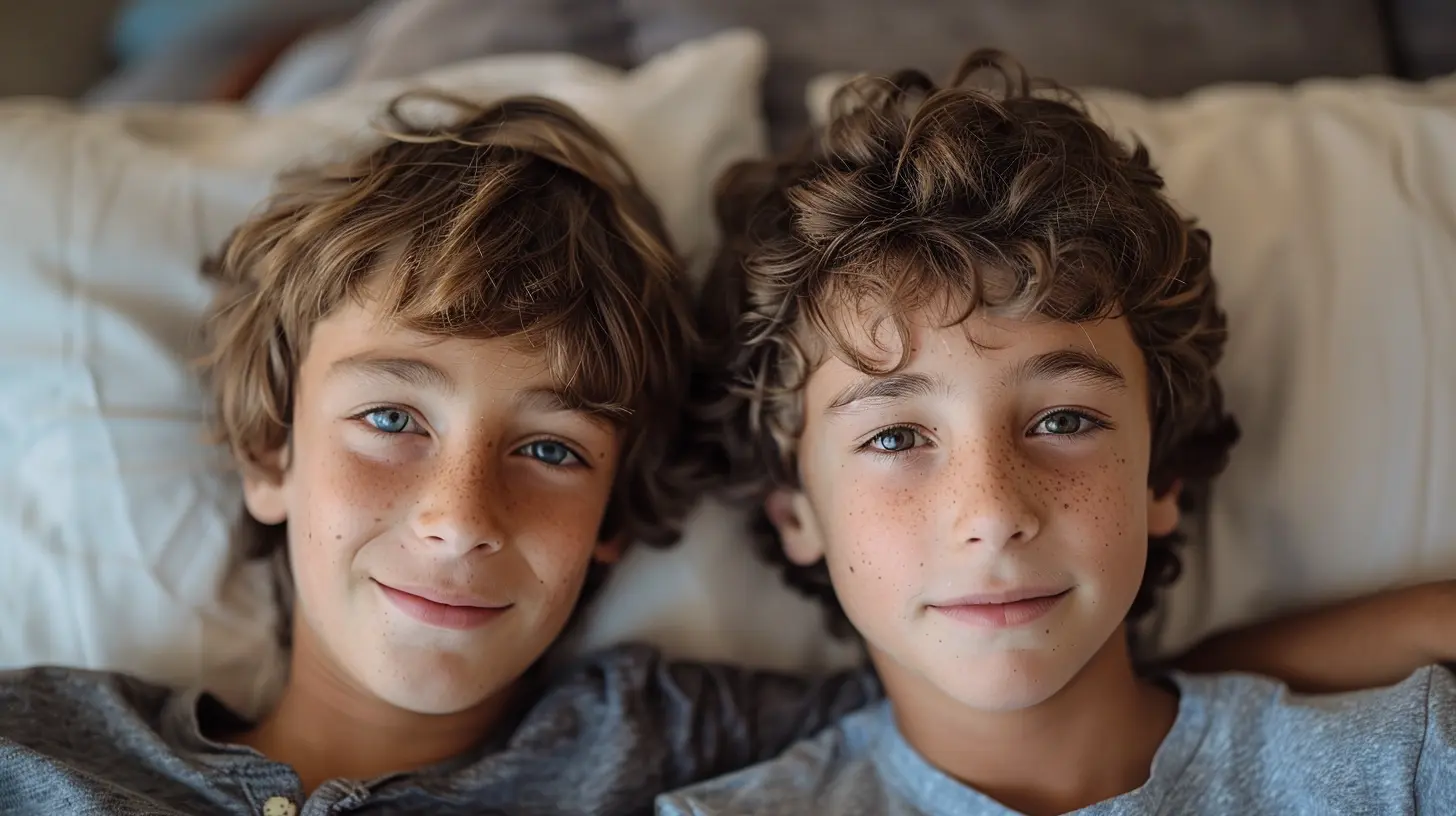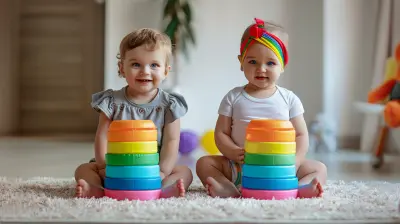How to Guide Your Kids Toward Lifelong Friendship as Siblings
23 November 2025
Sibling rivalry. It's a term we've all heard, probably experienced, and maybe even dreaded as parents. Yet, as much as we joke about siblings fighting like cats and dogs, wouldn't it be amazing to see your kids grow up as best friends? The kind of lifelong bond where they confide in each other, laugh at inside jokes only they understand, and lean on each other through life's ups and downs.
It’s not a far-fetched dream. With the right guidance, you can help your kids build that unshakeable sibling relationship. Sounds like a tall order, right? Don’t worry—I’ve got your back. Let’s dive into practical, easy-to-implement strategies that can foster love, respect, and, most importantly, friendship between your kids.
Why Sibling Friendship Matters
First, let’s talk about why this is even worth your time. Think about it: siblings are the people who’ve seen each other at their best and worst. They grow up in the same space, share childhood memories, and often experience life milestones together. Having a strong bond with a sibling means your child gets a built-in support system for life—a shoulder to cry on, a partner to celebrate with, and yes, even someone to tease a bit. (Because what’s sibling friendship without a little friendly banter?)Plus, research shows that positive sibling relationships can actually improve social skills, emotional intelligence, and even mental health. So, how do you steer them toward this kind of relationship? Let’s break it down.
1. Model the Behavior You Want to See
Kids are like sponges. They soak up everything you say and do—even the stuff you wish they wouldn’t notice (yes, all of it). If you want your children to get along, they need to see what healthy, respectful relationships look like in action.- Show respect: Are you snapping at your partner over small things? Your kids might mimic that same impatience with each other. Instead, talk calmly and respectfully during disagreements.
- Celebrate teamwork: When you and your partner—or even you and your sibling—work together on something, point it out. “Did you see how Aunt Sarah and I handled that? Teamwork makes everything easier!” Statements like these give them real-life examples to follow.
- Resolve conflicts thoughtfully: How do you handle a heated moment? Don’t just sweep it under the rug. Talk about how you resolved it and why compromising matters.
Kids learn by watching—so be the kind of sibling role model you’d want them to emulate.
2. Encourage Teamwork Early On
Let’s be real—kids argue. Sometimes over serious stuff, but mostly over who got the bigger slice of pizza (because, apparently, that’s a huge deal). That’s normal! The trick is to turn competition into collaboration.Ideas to Promote Teamwork:
- Group chores: Assign tasks they can only complete by working together. For example, one sets the table while the other clears it. They’ll learn that cooperation gets the job done faster.- Joint problem-solving games: Puzzles, scavenger hunts, or even building a LEGO structure together are great ways to promote teamwork while sneaking in a bit of fun.
- Sibling projects: Maybe they can bake cookies for grandma together or collaborate on a piece of art. It’s about creating moments where they work toward a shared goal.
When they learn to rely on each other early on, it lays the groundwork for a strong, lasting connection.
3. Teach Them How to Navigate Conflict
Let’s not sugarcoat it—siblings will fight. It’s natural. But how they handle those fights? That could make or break their bond. They don’t need to always get along (who does?), but they do need the tools to work through disagreements in a healthy, constructive way.Simple Conflict-Resolution Tools:
- “I feel” statements: Teach them to express feelings without pointing fingers. Instead of “You’re so annoying!” they can say, “I feel frustrated when you grab my stuff without asking.”- Take a breather: Sometimes, they just need space to cool off. Encourage a five-minute “chill-out” time before tackling the problem.
- Find a win-win: Challenge them to come up with a solution that works for both sides. If one kid wants to play outside and the other wants to watch a movie, maybe they agree to do one after the other.
- Fair rules for fairness fights: Make house rules when it comes to sharing and fairness so there’s no room for debate. For example, a rotating schedule for who gets to pick the movie or sit in the front seat.
Conflict doesn’t have to drive a wedge between them—it’s a chance for them to grow closer by learning how to work through their differences.
4. Carve Out Quality Time Together
Here’s a no-brainer: if you want your kids to bond, they actually need to spend time together. Sure, they’ll naturally cross paths during the day, but those moments are often rushed, chaotic, or happen when one kid is in a “mood.” Instead, carve out intentional, positive time for sibling bonding.Fun Ways to Bond:
- Family game nights: Board games are basically sibling relationship bootcamp. There’s strategy, teamwork, and a little (friendly) competition.- Outdoor adventures: Go on hikes, bike rides, or even just a trip to the park. The fresh air and relaxed environment do wonders for connection.
- Sibling-only traditions: Give them something that’s just theirs. Maybe it’s a Friday night popcorn party or an annual holiday tradition. Whatever it is, it strengthens their sense of shared history.
The point is to associate time spent together with positive, enjoyable experiences.
5. Celebrate Their Differences
No two kids are the same—thank goodness for that. But sometimes, their differences can create friction. Maybe one is artsy and quiet while the other is loud and athletic. They might struggle to understand each other’s interests or behavior.As a parent, it’s your job to show them that their differences are actually a strength. Highlight how they complement each other, like puzzle pieces that fit together.
- Point out their strengths: “Did you notice how your sister helped you with your drawing? She’s super creative!”
- Encourage their individuality: Let them pursue their own hobbies without comparison. This prevents resentment or jealousy from creeping in.
- Foster mutual respect: Use phrases like, “Your brother may not like soccer, but he loves cheering you on. That’s what makes a good team—you each bring something special.”
When they learn to value each other’s unique qualities, their relationship grows that much stronger.
6. Show Unconditional Love But Stay Fair
If there’s one thing kids will call you out on, it’s favoritism. Nothing sours a sibling relationship faster than the perception that one child is the “favorite.” It’s not always about what’s true—it’s about how they feel. To them, fair doesn’t mean “equal”; it means “considerate of their unique needs.”How to Stay Fair:
- Celebrate each child individually: Give them one-on-one time so they feel equally valued.- Acknowledge their emotions: Instead of brushing off jealousy, address it. “I know you’re upset that your sister got a new bike. Let’s talk about it.”
- Avoid labels: Don’t call one the “smart one” or the “funny one.” Kids live up (or down) to labels, and it can breed rivalry.
Unconditional love is the foundation of every great relationship. When kids feel secure in your love, they’re less likely to see each other as competition.
7. Be Patient and Realistic
Lastly, let’s talk patience. Building a lifelong sibling friendship doesn’t happen overnight—and it’s not always smooth sailing. There will be fights, door slamming, and maybe even a few tears (on your end too). And that’s okay.The goal isn’t perfection. It’s progress. Know that each small moment of kindness, each lesson in teamwork, and each giggle shared between your kids brings them closer to that lifelong friendship you’re dreaming of.
And remember, friendships evolve. The sibling bonds they create in childhood may look different as adults—but with your guidance, those bonds will remain strong.
Final Thoughts
Parenting is hard, and fostering strong sibling relationships is no exception. But the effort you put in now? It’s worth it. There’s nothing quite as heartwarming as seeing your kids laugh, share, and support each other—not just as siblings, but as friends.So, start where you are. Keep guiding, keep modeling, and keep cheering them on. One day, you’ll watch your adult kids cracking up over some childhood memory and realize, *Yep, they’re not just siblings—they’re best friends.
all images in this post were generated using AI tools
Category:
Sibling BondingAuthor:

Max Shaffer
Discussion
rate this article
1 comments
Phoebe O'Neal
In the shadows of sibling rivalry, an unbreakable bond hides. Discover the secret threads that weave enduring friendships between brothers and sisters. Unlock the mysteries of shared laughter and whispered secrets, guiding your children toward a lifelong alliance that transcends time and trials.
November 23, 2025 at 3:24 AM

Max Shaffer
Thank you for your insightful comment! Sibling rivalry can indeed hide deeper connections; nurturing those friendships with understanding and shared experiences is key to fostering lasting bonds.


